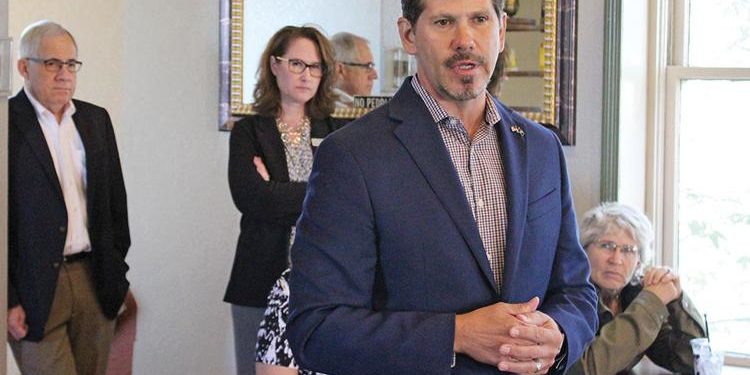ONTARIO — Although there had been talk several months earlier about him running for governor of Oregon, Knute Buehler said he didn’t decide until later in the summer of 2017 to throw his hat in the ring. He won the Republican nomination in the May Primary to be on the General Election ballot in November.
Buehler visited Malheur County on Tuesday and Wednesday during a campaign swing through eastern Oregon with the message that he, if elected, would provide strong leadership in helping deal with Oregon’s challenges such as the debt in the Public Employees Retirement System, the rural and urban divide, the low ranking of the state’s K-12 school system and homelessness.
Buehler grew up in Roseburg, he said, and attended Oregon State University, where he played baseball. He was OSU’s first Rhodes Scholar. After attending Oxford University, he then attended medical school at Johns Hopkins University in Baltimore, where he met his wife.
Buehler is an orthopedic surgeon in Bend, specializing in hip and knee replacement, but has now limited his practice to clinical work rather than doing surgeries.
He has represented House District 54 for four years, which takes up the City of Bend. Buehler said it is the most Democratic district in the state held by a Republican. While there are more Republicans than Democrats in Deschutes County, in one of the redistrictings, predominantly Democratic precincts were put together to form the district he now represents, he said.
Commenting that PERS is one of the state’s biggest challenges, Buehler said as governor he would not sign any spending bills until a PERS reform bill ended up on his desk.
His proposed reforms include stopping the large monthly payments that some retirees receive and putting on a cap for $100,000 a year, requiring government employees to contribute to their retirement funds, which should be transitioned to 401K plans.
Turning his attention to education reform, Buehler said he wants to put more money into the classroom, and would propose increasing the contribution to K-12 education from the General Fund by 15 percent. He would also put more money into technical education and require all ninth-graders to develop individual success plans, he said.
“A lot of dollars are allocated [to schools] through grants,” Buehler said.
He added that he would work to make sure that schools have equal access to grants.
“Because of Gov. [Kate] Brown’s indifference to fixing problems, classrooms have a funding crisis,” Buehler said, adding that Oregon’s graduation rates are among the worst in the nation and more funding is needed.
The urban/rural divide is one of his big concerns and he has ideas for breaking down the barriers between the two, Buehler said. He wants to have an annual conference involving people on both sides getting together for a discussion. He would also visit every county in the state, he said, referring to U.S. Sen. Ron Wyden as his example.
Buehler is a free trade advocate. Noting that Oregon is a trade-dependent state, he said that some people were hit hard by the North American Free Trade Agreement, and some improvements need to be made.
He also is an advocate for the proposed construction of a natural gas energy facility at Coos Bay from which liquid natural gas could be shipped to markets around the world.
The facility would create 3,500 construction jobs over two to four years, paying an average of $80,000 a year, and would create 250 permanent jobs that provide high wages and good benefits, according to information provided by Buehler.
His plan to address homelessness includes providing Medicaid dollars for both community physical and mental health clinics that are easily accessed by people who are homeless, according to a news release.
Buehler would also dedicate $10 million to replace camps for homeless people with 8,000 new shelter beds, work to fast-track new housing units to provide affordable housing, provide housing assistance for working families and work to provide more tools for safer streets.
The central-Oregon lawmaker said the main reason he chose to run for governor is what saw as a lack of leadership from the current governor.







